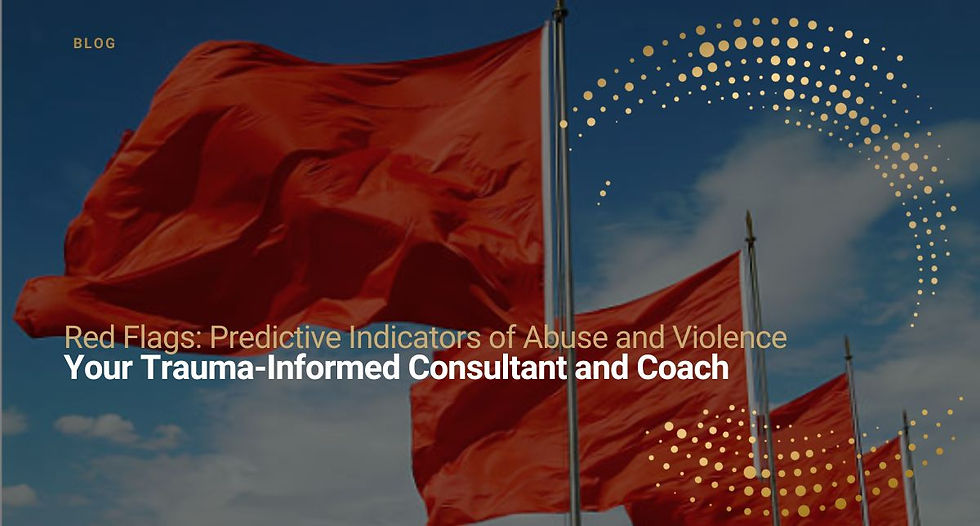FINANCIAL ABUSE AND ECONOMIC CONTROL: Financial Abuse Recovery and Safeguarding Financial Assets
- themothercorp
- Mar 25
- 4 min read

Financial abuse is a pernicious form of abuse that involves restricting access to money and economic resources to impact and limit a person’s financial independence. This form of abuse can occur within a romantic relationship or begin after a relationship breakdown. Economic abuse is a frequent aspect of gender-based violence, and it requires skilled and effective intervention to lessen its impact, as it can create long-term harm.
As a trauma-informed Divorce Coach, I specialize in providing effective support for individuals navigating the complexities of high-conflict relationship breakdowns, gender-based violence, financial abuse, hidden abuse, and post-separation abuse. By understanding these challenges, I help my clients navigate securing their finances, support their financial rebuild and recovery, collaborate with legal and financial professionals, and take actionable steps toward economic stability. Given the long-term impact of financial abuse, I prioritize practical strategies, knowledge, and tools to help my clients regain financial stability and move forward with confidence.
UNDERSTANDING FINANCIAL ABUSE
Financial abuse can take different forms, sometimes beginning subtly and becoming more pronounced over time. It limits a person's ability to manage their own finances and make independent choices. This can impact both the present and future, and it requires careful attention because of the long-term implications. Financial control can impact the perception of the ability to leave or recover from abusive relationships. Identifying financial abuse is an important step toward addressing it and requires meaningful action to safeguard against it.
EARLY STAGES OF FINANCIAL ABUSE
In its early stages, financial abuse may appear as:
Controlling how money is spent
Withholding money or restricting access to finances
Limiting access to basic living resources such as food, medication, or housing
Preventing a partner from working or earning income
Monitoring spending and requiring justification for purchases
Placing all financial accounts under one partner’s name (who holds the assets, who has the debt, and who has good credit all make a difference)
Refusing to contribute to household expenses
(BWSS, 2025)
Economic abuse can interfere with an individual’s ability to access, manage, or maintain financial resources, affecting long-term financial stability (Adams et al., 2008). It often occurs alongside other forms of coercive control, making it challenging to address.
PROGRESSION OF ECONOMIC ABUSE
If left unaddressed, economic abuse can become severe, including:
Taking a partner’s money, identity, credit, or property without consent
Forcing a partner into non-consensual debt
Concealing financial information, accounts, and assets
Damaging a partner’s credit score
Financial litigation
Limiting access to necessary resources, such as the ability to pay for a lawyer
Creating barriers to employment opportunities
Creating barriers to retirement
Financial insecurity can have long-term effects on wellbeing, shaping economic stability for years. Challenges can include debt, negatively impacting credit scores, difficulty securing housing as rentals usually rely on a credit score, and financial uncertainty, if not hardship.
Have you gotten my free Guides? Get them now

REBUILDING FINANCIAL STABILITY
Recovering from financial abuse takes time. By securing skilled support from a trauma-informed Divorce Coach, individuals can rebuild their financial autonomy. Key steps include:
Gaining a clear understanding of all personal finances
Securing financial documents to demonstrate facts
Creating and securing independent bank accounts
Addressing credit challenges and developing a strategy for financial recovery, including repairing credit scores
Learning about the financial protections available
Exploring income-generating opportunities, including employment and entrepreneurship
Selecting key legal and financial professionals for divorce for women—read this article I contributed to by Sapling FP for more insights.
FINANCIAL ABUSE RECOVERY AND SAFEGUARDING FINANCIAL ASSETS
As a trauma-informed Divorce Coach, I work with clients to safeguard their financial wellbeing, especially those experiencing financial abuse. This includes:
Safeguarding and clarifying financial standing
Protecting financial accounts and assets
Securing trusted legal and financial professionals
Addressing financial aspects that contribute to calculating child and spousal support
Repairing credit
Improving financial stability
Developing long-term financial strategies
Beyond immediate financial security, I assist clients in identifying steps for financial safeguards and stability. This includes career-building strategies, monetizing skills, and exploring employment opportunities, including salary and benefits negotiation.
With structured support from a trauma-informed Divorce Coach, clients make meaningful progress toward safeguarding their finances. By taking effective, informed steps, my clients rebuild their financial security and move forward with confidence.
BOOK A COMPLIMENTARY SESSION
If you are navigating separation, divorce, financial abuse or economic control, support is available. Schedule a free consultation call to gain clarity on your situation and explore tailored solutions.
Virtual or phone sessions.
English services are offered globally.
Secure Email: themothercorp@proton.me
Website: www.themothercorp.com
STAYING IN TOUCH
The Mother Corp is committed to ensuring people are meaningfully accompanied through hardship.
For one-on-one support, please get in touch for a free call:
Secure email: themothercorp@proton.me
or book here
Let's stay connected.
For individuals, join my newsletter here and grab your free Holistic Self-Care Guide.
For professionals, join my newsletter here and get your Trauma-Informed Workplace Best Practices Guide here.
Connect with me online: Instagram, Bluesky, and Facebook (@TheMotherCorp)
If someone you know could benefit, please share this with them.

ABOUT THE AUTHOR
Chavisa Horemans, MES, CDC, CTRC
Chavisa Horemans is a trauma-informed consultant specializing in evidence-based, holistic support for individuals navigating complex challenges.
She holds an interdisciplinary Master’s degree in social sciences and a Graduate Diploma in adult education. Her areas of expertise include Gender-Based Violence, Hidden Abuse, Financial Abuse, and Post-Separation Abuse.
Chavisa is a Certified Divorce Coach (CDC, ICF), specializing in supporting parents involved in high-conflict disputes.
She is also a certified Trauma Recovery Practitioner (CTRC), helping individuals process and recover from trauma. She continues to deepen her knowledge through ongoing training in trauma-informed interventions and The Trauma of Money (in progress)
For secure communication, she can be reached at themothercorp@proton.me.
Please join my community for individuals: join me here to get started.
For professionals, click here to get started.
If this resonates, please reach out.
If you know someone who would benefit, please share this with them.



Comments